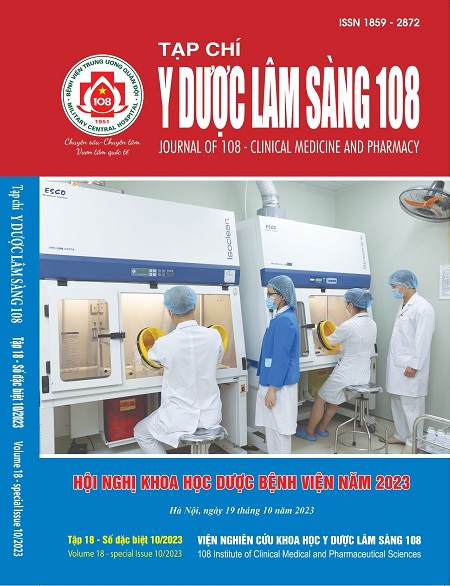Evaluation of the effectiveness of clinical pharmacists’ consultation for cancer patients on chemotherapy at 108 Military Central Hospital
Main Article Content
Keywords
Abstract
Objective: The aim of this study is to assess the efficacy of clinical pharmacist consultation and the level of satisfaction among cancer patients undergoing cycle 1 chemotherapy. Subject and method: The pre-post intervention study was conducted on 79 cancer patients who were undergoing cycle 1 chemotherapy at the 108 Military Central Hospital. Result: The findings of this study indicate that cancer patients who underwent chemotherapy experienced a significant increase in their knowledge score, which rose from 35.7 to 73.3 out of 100 (p<0.001). The majority of the questions (10/15), exhibited a twofold increase in the proportion of patients who responded accurately after having consultation. There was a statistically significant increase in the proportion of patients who provided correct answers in regarding general treatment knowledge and chemotherapy regimens as separate entities. Following the counseling sessions, a significant majority of patients (98.7%) expressed their positive evaluation of the counseling activities as being “beneficial”. All participants expressed the significance of receiving counseling from clinical pharmacists as "important", and they found the information provided to be "sufficient". 97.5% of patients expressed a level of satisfaction categorized as either "satisfied" or "very satisfied" with regards to the duration of their consultation. Conclusion: Counseling by clinical pharmacists has a significant impact on enhancing the level of knowledge among cancer patients who are undergoing cycle 1 chemotherapy. The integration of medication counseling into regular practice serves to enhance the existing counseling model. The objective is to enhance the quality of cancer treatment at the hospital.
Article Details
References
2. Vũ Thị Diệu Huế (2022) Khảo sát đặc điểm kiến thức và hành vi tư chăm sóc của bệnh nhân ung thư điều trị hóa chất tại Bệnh viện Trung ương Quân đội 108. Khóa luận tốt nghiệp dược sĩ, Trường Đại học Dược Hà Nội.
3. Amina Mohamed Rashad El-Nemer, Maha Ibrahim Ismail El-Zafrani et al (2015) Utilization of a self- care educational program for alleviating chemotherapy induced physical side effects. Journal of Cancer Treatment and Research 3(1): 8-16..
4. Busch EL, Martin C et al (2015) Functional health literacy, chemotherapy decisions, and outcomes among a colorectal cancer cohort. Cancer Control, 22(1): 95-101.
5. Coolbrandt A, Van den Heede K et al (2013) The Leuven questionnaire on patient knowledge of chemotherapy (L-PaKC): Instrument development and psychometric evaluation. Eur J Oncol Nurs 17(4): 465-73.
6. Dang CC, Amiruddin M, Lai SS, Low CF and Chan SY (2017) An Emerging Role of Pharmacist in Pre-chemotherapy Counseling Among Breast Cancer Patients. Indian J Pharm Sci 79(2): 294-302.
7. Elliott MN, Lehrman WG, et al (2012) Gender differences in patients' perceptions of inpatient care. Health Serv Res 47(4): 1482-501.
8. Jiang Y, Sereika SM et al (2016) Beliefs in chemotherapy and knowledge of cancer and treatment among african american women with newly diagnosed breast cancer. Oncol Nurs Forum 43(2): 180-189.
9. Organisation World Health (2018), Retrieved August 23th, 2023, from https://www. who.int/health-topics/cancer#tab=tab_1.
10. Park D, Patel S et al (2022) Impact of pharmacist-led patient education in an ambulatory cancer center: A pilot quality improvement project. J Pharm Pract 35(2): 268-273.
11. Torre LA, Bray F et al (2015) Global cancer statistics 2012. CA Cancer J Clin 65(2): 87-108.
 ISSN: 1859 - 2872
ISSN: 1859 - 2872
